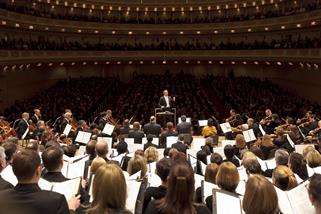|
Back
An Unforgettable Orchestral Otello New York
Carnegie Hall (Isaac Stern Auditorium)
04/15/2011 - & April 7, 9, 12, 2011 (Chicago)
Giuseppe Verdi: Otello
Aleksandrs Antonenko (Otello), Krassimira Stoyanova (Desdemona), Carlo Guelfi (Iago), Barbara Di Castri (Emilia), Juan Francisco Gatell (Cassio), Michael Spyres (Rodrigo), Paolo Battaglia (Montano), Eric Owens (Lodovico), David Govertsen (Herald)
Chicago Symphony Chorus, Duain Wolfe (Director), Chicago Children’s Choir, Josephine Lee (Artistic Director), Chicago Symphony Orchestra, Riccardo Muti (Music Director)

R. Muti (© Richard Termine)
There was a buzz of excitement and anticipation in the beautiful auditorium of Carnegie Hall, where musical glories of the past almost seem to be etched into the fabric of the building. And here was a great maestro, conducting his beloved Verdi and finally – after medical setbacks – taking the helm of one of the world’s great orchestras. His reputation in New York has long been legendary, but after his extraordinary series of performances at the Met last season of an early and relatively minor work of Verdi, Attila, what, we wondered, would it be like to hear him (and several hundred people on stage) in one of Verdi’s greatest operas, Otello?
The auditorium was packed. Eminent musicians were in the audience. When Muti came out, after his soloists had taken their seats, he was greeted with what can only be described as a roar of welcome. He bowed rather briefly and with a flick of his baton plunged us into an orchestral and choral storm of almost primeval force. We were on the edge of ours seats. The energy and the inexorable sense of forward movement – of fate really – never let up until the opera ended three hours later. Muti maintained absolute control. And the audience remained absolutely rapt.
With concert performances, one often feels that something essential is lost and, of course, it is. Opera by its nature is a multi-faceted art form, but on this evening, the fact that it was not staged or even semi-staged, was an essential ingredient of the revelatory result. The orchestra was out of the pit; our focus was on them, with the solo singers forming a part of Muti’s musical tapestry. And within that tapestry were threads – orchestral colors, textures, nuances – details that stood out as never before.
And of course, all of us -- members of the orchestra, soloists, choristers, and the audience -- had our eyes on Muti. It was extraordinary just to watch him on a brightly lit stage, not deep in an orchestra pit, mostly shrouded in darkness. Verdi’s genius and every magnificent moment of his penultimate masterpiece seemed to flow right through Muti’s body. He leaned in and drew out. He crouched and he jumped. All those forces were massed before him – the entire Chicago Symphony Orchestra, 175 members of its chorus and 30 members of its children’s chorus. Muti knew exactly what he wanted. After three performances in Chicago and a rehearsal the afternoon of this concert, they knew it too. And they gave it to him. From the primal force of the storm that opens the opera to the softest whisper of the “Ave Maria” and every texture and dynamic in between. Parts of the opera had an almost chamber music feel. And there were moments of solo instrumental magic – most memorably the harp solo at the end of the first act and the English horn solo at the beginning of the last act.
There had been concern that Muti might not be able to appear at all. In February, he fainted while conducting a rehearsal in Chicago. He suffered very painful facial fractures and also had a pacemaker implanted. He has said he has residual swelling but there was no trace of any indisposition or loss of energy. And that marvelous face – the profile and the persona – still seemed to gaze out at us from a Renaissance painting.
Muti’s Otello provided something most American ears had never heard: For the concertato that ends the third act, he substituted a scaled down revision that Verdi wrote for the Paris performances in 1894, seven years after the opera premiered at La Scala. The texture was more transparent; the dramatic action much more clear. It was fascinating to hear how Verdi rethought a masterwork.
Aleksandrs Antonenko, who was heard earlier this season as The Pretender in the Met’s new production of Boris Godunov, sang Otello in earlier performances with Muti, not just in Chicago but in Salzburg in 2008 and later in Rome. His style is not Italianate, but he has a lovely tone and ping and the all-important power to cut through that huge orchestra; His “Nium mi tema” was truly the lament of a broken man.
Krassimira Stoyanova sang Mimi earlier this season in a marvelous La bohème at the Met with Joseph Calleja. She was simply ravishing as Desdemona. Her “Willow Song” had members of the audience in tears. (I heard someone say “I can die now having heard that.”) And her “Ave Maria,” with gorgeous floated pianissimos was otherworldly.
Carlo Guelfi, the Iago, was in an unenviable situation. He was a last minute replacement for Nicola Alaimo (who had sung the role with Muti several times before) and, consequently or coincidentally, he was placed on stage right under Muti’s baton. He gave a valiant performance, totally invested dramatically, but not up to the level of Antonenko or Stoyanova vocally. One could feel the effort and concentration that went into his performance. This is the first time I have ever empathized with an Iago!
These were fine singers but not stars of the first rank. Thus their singing could be experienced as part of a musical (really an orchestral) fabric. The entire cast acquitted themselves well, some better than others. But at the end of the evening, the triumph was Muti’s – and Verdi’s.
Arlene Judith Klotzko
|